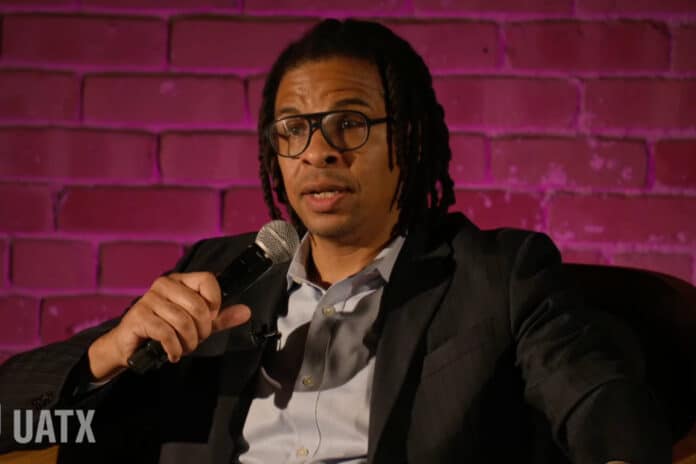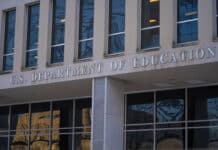
Harvard professor Roland Fryer, who at age 30 became the youngest African-American to ever be awarded tenure at the Ivy League school, has revealed he faced threats and had to get armed security after publishing a study showing no racial bias in police-involved shootings.
Mr. Fryer, who has received numerous awards for his academic research, in 2016 published a study that turned on its head the prevailing leftist narrative that police-involved shootings are tinged by racism.
His study found that, while black people were more likely to be the target of non-lethal police force, such as being thrown against a wall, they were no more likely to be shot than whites.
In fact, after controlling for a variety of different circumstances, Mr. Fryer’s research actually found that officers were less likely to shoot at black people than at white people in similar situations, although the difference was not statistically significant.
His findings contradict the claim made by groups like Black Lives Matter that police readily resort to lethal force when dealing with black suspects.
“I let the data talk, and I don’t care what it says,” Mr. Fryer said during a 2022 video conference discussing his work. “I’m willing to tell the truth. I don’t care about the personal cost.”
“I believe the literal truth will set us free,” he added.
More recently, in a Feb. 13 interview with Bari Weiss of The Free Press, Mr. Fryer discussed the price he had to pay for telling the truth.
He said that, after he published his study (against the advice of his Harvard colleagues), people “lost their minds” and he faced a torrent of complaints and threats.
‘All hell broke loose’
Mr. Fryer told Ms. Weiss that he expected his research to show different conclusions, given the prevailing narratives that police are driven by racial animus to shoot blacks at disproportionately higher rates.
He said that, when his research showed no racial bias in police-involved shootings, he hired a new team of assistants and repeated the study, but the results were the same.
Familiar with the results, his Harvard colleagues urged him not to publish his research, telling him he’d ruin his career.
Undeterred by the warnings, he published his study and within minutes the hate came flowing. He said he faced a relentless torrent of threats and complaints.
“All hell broke loose,” he said, adding that he was forced to live under police protection for over a month after his study was published.
“I was going to the grocery store to get diapers with the armed guard. It was crazy. It was really, truly crazy,” Mr. Fryer said, recalling a time he went shopping for diapers for his seven-day-old daughter.
Later, at the height of the “Me Too” era, Mr. Fryer was suspended from Harvard for two years after being accused of engaging in “unwelcome conduct of a sexual nature,” which he denies.
Former Harvard President Claudine Gay, who at the time was the dean of the institution, alleged that Mr. Fryer’s conduct “exhibited a pattern of behavior” that failed to meet expectations.
A documentary entitled “How Claudine Gay Canceled Harvard’s Best Black Professor” dug into the circumstances of his suspension, concluding that it was an “ideological purge” for daring to upend woke orthodoxies with his contrarian writings about race and policing, as well as race and education.
One of Mr. Fryer’s other studies on the black achievement gap found that not racism but quality teachers and good parenting play a key role.
Ms. Gay was recently forced to resign from her role as Harvard president amid a plagiarism scandal.
Claudine Gay resignation
Ms. Gay, who was Harvard’s shortest-serving president, resigned on Jan. 2 after mounting plagiarism allegations.
Harvard acknowledged that she plagiarized in her dissertation and other papers, though the university said in a Dec. 12 statement that its analysis found “no violation of Harvard’s standards for research misconduct” and reaffirmed its confidence that Ms. Gay “is the right leader.”
Ms. Gay said in a letter that she had made the decision to quit because it had become “clear that it is in the best interests of Harvard for me to resign so that our community can navigate this moment of extraordinary challenge with a focus on the institution rather than any individual.”
She did not take responsibility for the plagiarism allegations and, despite the resignation, Ms. Gay remains a Harvard faculty member.
Besides plagiarism allegations, Ms. Gay also faced criticism for a spate of alleged anti-Semitic incidents on campus in the wake of Israel’s military operation in Gaza after operatives of the Hamas terror group killed about 1,200 Israelis in border communities.
Later, Harvard faced what could be a fresh plagiarism scandal after the university’s chief diversity and inclusion officer was accused of lifting significant portions of her academic work without quotation marks.
















